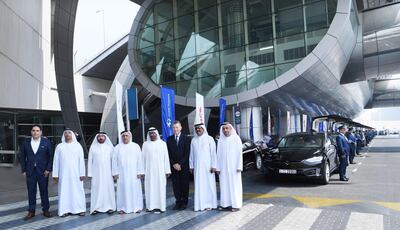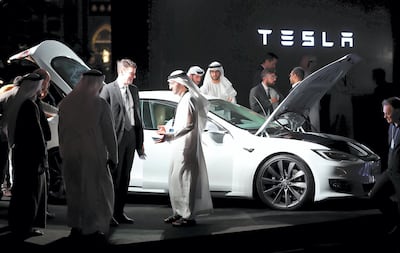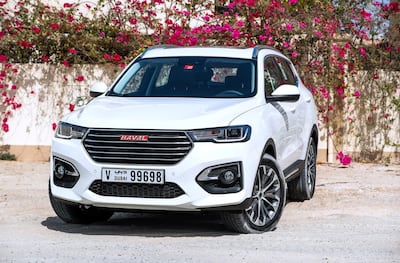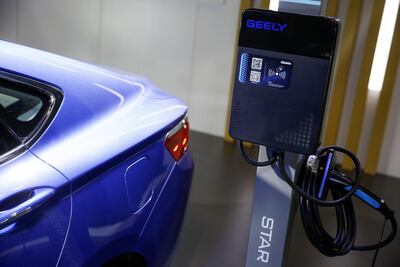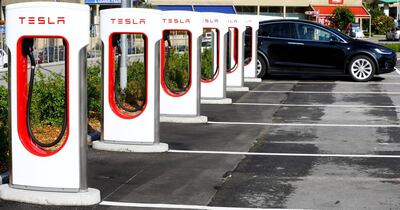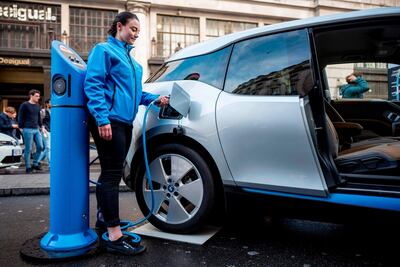When Mohammed drives his Tesla Model X electric car through the busy roads of Dubai, he frequently attracts attention from other motorists.
Some look at his wheels with apparent curiosity, while some even honk at him while his car is stopped at the red signal, assuming that he has mistakenly switched off the engine.
“My car makes no sound ... its pure electric and I am a proud owner of it. I waited for a long time to buy this ‘green’ machine,” said Mohammed, an investment banker, who preferred to go by his first name.
When California-based Tesla opened its first luxury electric vehicle (EV) dealership in the Middle East in Dubai last summer, many car analysts expressed mixed opinions. But, so far, it has proved to be a successful move - and sales are healthy. In addition, Teslas make up part of the fleet of Dubai taxi fleet and its electric cabs, with semi-autonomous features, made 64,186 trips with a customer satisfaction rate of 97 per cent, in the first six months of their introduction, according to the emirate's Roads and Transport Authority.
EVs share of global car sales is forecast to rise from 1 per cent in 2017 to 2.5 per cent by 2020, according to the Bank of America Merrill Lynch’s Thematic Investing report, which predicts that by 2050 they will constitute 90 per cent of sales.
The UAE Government is targeting up to 15 per cent reduction in carbon emissions by 2020 – and a 20 per cent adoption of EVs within its own fleet.
Dubai will spend millions of dirhams on incentives to have 42,000 EVs on its streets by 2030.
Almost all the big car makers see immense potential in the region, led by the UAE, and plan new launches of EVs in the coming years.
"General Motors is committed to a future with zero emissions, in which electric vehicles are the standard for efficient, sustainable transportation," John Roth, president and managing director – GM Africa and Middle East, told The National.
GM expects to boost sales in the Middle East and Africa with the launch of its Chevrolet electric vehicle. It sold its first Bolt EV in the region in August this year. In addition, Dubai Police operates a small fleet of Bolt EV's.
“The UAE is an important market for us. We are looking beyond our walls, recognising the needs of all of us for the next years in transportation, and partnered with Honda to work towards the auto industry’s first fuel cell system mass production,” stated Mr Roth. Fuel cellcars differ from battery vehicles in that they generate electricity rather than used stored eelectricity to run the motor, normally using compressed hydrogen. Most of these vehicles are classified as zero-emission as they discharge only water and heat.
Twelve electrified vehicles are currently in GM’s global portfolio and at least 20 new all-electric vehicles will be introduced by 2023 - two of which will be introduced by mid-2019. In the UAE, it is also looking to become a partner in Dubai Government’s Green Mobility Initiative that targets a 10 per cent share of EVs in government fleets by 2030.
The Chinese car maker Haval, which aims to double its sales in the UAE by capitalising on the demand for 4x4s, is planning to go big with EVs in the region.
"Electric vehicles are part of Haval's expansion plans in the UAE. In China, we already have electric versions of Haval and by 2020 we are expecting to see similar models coming to the UAE," Greg Cottrell, general manager of the automotive division for Swaidan Trading - the automotive division of Al Naboodah Group Enterprises, which operates the Haval dealership in the emirate, told The National.
_______________
Read more:
Tesla investors cheer best-ever quarter but analysts aren't so sure
Volvo invests in FreeWire to address electric car charging hiccups
Range anxiety: can the Toyota Camry hybrid go the distance?
_______________
The Swedish car maker Volvo, which is planning to roll out its first fleet of autonomous vehicles by 2021, sees the UAE as a potential market given its infrastructure growth, good roads and better connectivity.
"By importing electric cars, adding them to government entities' fleets and offering attractive incentives to buyers … Dubai is moving ahead," Jesus Mesa, managing director of the Importers Organisation within Europe, Middle East and Africa Region at Volvo, told The National.
“Technology has matured and our [Middle East] customers are ready to adopt but we will ramp up volumes step by step. We put people first and understand that customers want a better, more efficient form of mobility.”
Recently, Volvo acquired a stake in San Francisco-based electric car charging company FreeWire Technologies. It has also reached an agreement with Baidu, the leading Chinese internet search provider, to jointly develop electric cars with the aim of mass producing them for China, the largest car market in the world.
“We are committed to put 1 million electrified cars on the road by 2025 and our 50 per cent of sales volume will be fully electric by 2025,” said Mr Mesa.
There were more than 3 million electric and plug-in hybrid cars on the roads worldwide in 2017, a 54 per cent increase over 2016, according to the International Energy Agency’s latest report.
China remained the largest electric car market in the world, accounting for nearly 50 per cent of the global total sold last year. Nearly 580,000 electric cars were sold in China while the US was the second-biggest market with sales of nearly 280,000 EVs in 2017.
Nordic countries led in terms of market share. Electric cars accounted for 39 per cent of new car sales in Norway, making it the world leader in terms of EV market share. In Iceland, new EV sales made up 12 per cent of the total while the share was 6 per cent in Sweden.
In the Middle East, car makers expect many countries to build necessary infrastructure to support the ambitions of EVs.
“In the prioritisation, we first focus on Europe, China and the US, then as the second step on the other markets … but of course infrastructure will evolve in the Middle East,” said Wilko Stark, vice president Daimler and Mercedes-Benz cars strategy and head of Case (connected, autonomous, shared and services and electric), adding, “However, the key question is what is being done to build charging infrastructure.
“The whole mobility is shifting from combustion engines to electric, so [the Middle East] should invest also in building the infrastructure.”
There are several factors that will enable a smooth shift towards EV uptake, according to the Bank of America’s survey, most notably falling battery costs, rising number of available models, increasing incentives and shifting consumer preferences.
In 2017, an EV battery cost a fifth of what it was in 2010, and that is predicted to fall around 6 per cent per year to 2030. This would result in the average cost of global EV powertrains coming down from around $16,000 in 2016 to $7,000 in 2030, putting it on par with combustion engines.
in a recent Bank of America survey, nearly 10 per cent of respondents (out of 26,000 surveyed) said they would consider buying an EV as their next car.
US giant Ford will introduce four hybrid vehicles - which use both combustion and electric power sources - over the next three to four years, as part of its electrified vehicle plan.
German car makers such as BMW, Mercedes and Volkswagen are also gearing up with new electric models as they bid to catch up with the growth of Tesla among more affluent EV drivers.


